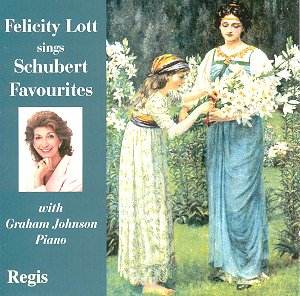Franz SCHUBERT (1797-1828)
Songs
1. Die Forelle
2. An Sylvia
3. Heidenroslein
4. Du bist die rühe
5. Der Musensohn
6. An die Musik
7. Auf dem wasser zu singen
8. Sei mir gegrusst
9. Litane: auf dem Fest Allerseelen
10. Die junge Nonne
11. Ave Maria
12. "Ellens Gesang III" Im Fruhling
13. Gretchen am Spinnrade
14. Nacht und Träume
15. Ganymed
16. Lied der Mignon
17. Seligkeit
 Felicity Lott
(soprano) Felicity Lott
(soprano)
Graham Johnson (piano)
Rec 6th-7th February 1988, Haberdashers Aske's, London
 REGIS RRC 1052
[65.08] REGIS RRC 1052
[65.08]
For around £6 from your retailer |
 |
Felicity Lott and Graham Johnson recorded this recital for IMP Classics in
1988, since when they have remained at the forefront of their field: there
is no question that they are among the world's leading artists in the lieder
repertory. So at bargain price (as previously) this disc is quite literally
a bargain, and anyone seeking a top class survey which includes the most
popular Schubert songs need not hesitate.
Schubert was a fluent and prolific composer, and to some extent his lack
of material success in Vienna allowed him to devote his time and attention
to the more intimate forms of musical expression, in particular the solo
song with piano. Before and during his lifetime, the composition of lieder
was principally an amateur pursuit, and professional, 'successful' composers
only turned to the genre as a diversion from other, more prestigious and
lucrative activities.
In the longer term, Schubert's output of more than six hundred songs established
both a repertoire and an artistic frame of reference. Later composers built
upon, and sought to emulate, his achievement, though none has ever surpassed
it: Schumann, Brahms, Liszt, Wolf, Mahler, Strauss. In this context Nacht
und Träume (1822), with its emphasis on the discovery of the unconscious
through the imagery of night, is perhaps the most romantic song Schubert
ever wrote. Felicity Lott adopts a daringly slow tempo, but with her accompanists
support she achieves a lovely floating tone and carefully controlled dynamic
range which convey the essential characteristics of the song.
In fact these features are found throughout the recital. There is a marvellous
tone, allied to sensitive phrasing (Johnson is in his element here), secure
breath control and awareness of style. The highlights abound, but they definitely
include Du bist die rühe and Ganymed, in both of which
the control of dynamics is remarkable. To make the point, contrast the lightness
of Ganymed with the richer tone offered in Mignons Lied and
the sombre mood in Litanie. If there is a caveat, it is very slight:
a tendency to be rather full in tone and quasi operatic in some of the lighter
songs, for example An die Musik.
Graham Johnson is a specialist in this field and his imagination and control
are exemplary. The accompaniments are subtle and beautifully shaded, always
adding an extra dimension to the performances. There is a helpful booklet
essay by James Murray, which has something to say about each song. However,
on the debit side (as in the previous issue), there are no texts and
translations.
Terry Barfoot

